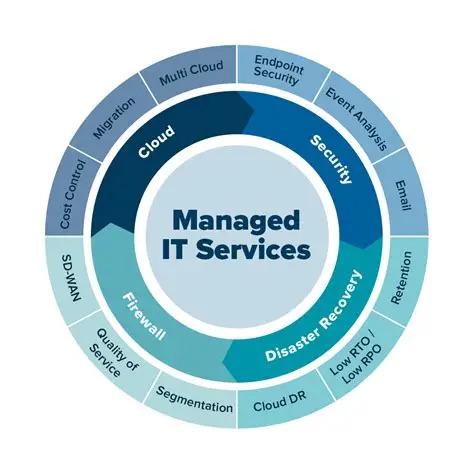In today’s fast-paced digital world, technology is the foundation of almost every business operation. From communication and collaboration to cybersecurity and data management, IT plays a critical role in enabling efficiency and innovation. However, as systems grow more complex and threats more sophisticated, maintaining a secure and optimized IT environment has become both expensive and time-consuming for companies.
This is where Managed IT Services emerge as the smart, scalable solution for modern businesses. By outsourcing IT management to a team of specialists, organizations can focus on their core operations while ensuring their technology infrastructure runs smoothly, securely, and cost-effectively.
1. What Are Managed IT Services?
Managed IT Services refer to the practice of outsourcing a company’s IT operations to a third-party provider known as a Managed Service Provider (MSP). These providers handle a range of functions—such as network monitoring, cybersecurity, data backup, cloud management, and help desk support—under a fixed service agreement.
Instead of reacting to problems after they occur, MSPs use proactive monitoring tools to detect and resolve issues before they disrupt business operations. This shift from a break-fix model to a preventive maintenance approach is one of the biggest advantages of managed IT.
2. The Growing Need for Managed IT in Modern Business
As companies embrace digital transformation, they rely on multiple interconnected systems—cloud platforms, mobile devices, remote work tools, and Internet of Things (IoT) devices. Managing all of these efficiently requires specialized expertise and 24/7 vigilance.
However, hiring a full internal IT department can be prohibitively expensive, especially for small and medium-sized businesses (SMBs). Managed IT Services offer an affordable alternative, providing enterprise-level support at a predictable monthly cost.
Moreover, cybersecurity has become a top concern. With ransomware attacks, phishing scams, and data breaches on the rise, even a single vulnerability can lead to financial and reputational damage. MSPs implement advanced protection tools and real-time threat detection to safeguard networks and data from ever-evolving cyber threats.
3. Key Benefits of Managed IT Services
a. Cost Efficiency and Predictable Spending
Managed IT eliminates the need for heavy upfront investments in hardware, software, and personnel. Businesses pay a fixed monthly fee for a customized package of services, allowing them to plan budgets more effectively and reduce unexpected repair or downtime costs.
b. 24/7 Monitoring and Support
Modern IT systems never sleep—and neither should their management. MSPs offer around-the-clock monitoring, ensuring that potential problems are identified and resolved before they affect productivity. Many also provide help desk support to assist employees with day-to-day technical issues.
c. Enhanced Cybersecurity
Cybersecurity is one of the most valuable aspects of Managed IT Services. Providers use a multilayered defense strategy that includes firewalls, endpoint protection, threat intelligence, vulnerability scanning, and regular security updates. Some also offer employee cybersecurity training, helping businesses build a culture of awareness.
d. Scalability and Flexibility
As your business grows, so do your IT needs. Managed IT Services are designed to scale effortlessly—whether you’re adding new users, expanding to multiple locations, or integrating new technologies. This flexibility allows you to stay agile without having to overhaul your infrastructure.
e. Access to Cutting-Edge Expertise
MSPs employ certified professionals with expertise across various domains—networking, cloud computing, cybersecurity, compliance, and more. Businesses gain access to high-level knowledge without the burden of recruitment and training costs.
f. Focus on Core Business Goals
With IT operations in expert hands, business leaders and teams can redirect their energy toward growth, innovation, and customer satisfaction instead of troubleshooting IT issues.
4. How Managed IT Services Drive Digital Transformation
Modern organizations are under constant pressure to innovate and adapt. Cloud computing, AI, automation, and remote collaboration are reshaping industries. Managed IT Services help companies embrace these technologies confidently.
-
Cloud Migration and Management: MSPs handle the planning, deployment, and maintenance of cloud solutions such as Microsoft Azure, AWS, or Google Cloud—optimizing cost, performance, and security.
-
Automation and Efficiency: Routine maintenance, updates, and monitoring are automated to minimize downtime and human error.
-
Data Analytics: With advanced tools and monitoring, MSPs can provide insights into system performance and user behavior, guiding smarter business decisions.
By combining technology and strategic guidance, MSPs become more than just support teams—they evolve into long-term digital partners.
5. Choosing the Right Managed IT Partner
Selecting the right Managed Service Provider is crucial to achieving maximum value. Here are a few factors to consider:
-
Experience and Reputation: Look for an MSP with proven experience in your industry.
-
Security Standards: Ensure they follow best practices such as multi-factor authentication, encryption, and compliance with standards like ISO 27001 or GDPR.
-
Service Level Agreements (SLAs): Clear SLAs outline performance metrics, response times, and accountability.
-
Customization: The best MSPs tailor their services to align with your business goals, infrastructure, and budget.
-
Communication and Transparency: Choose a provider that offers regular reports, strategy meetings, and open communication channels.
6. The Future of Managed IT
The demand for Managed IT Services continues to grow as businesses adopt hybrid work models and depend more heavily on digital tools. Artificial intelligence and predictive analytics are enhancing MSP capabilities, enabling them to forecast and prevent IT issues before they even surface.
In the future, Managed IT will play an even bigger role in sustainability, compliance, and automation—empowering companies to operate smarter, safer, and more efficiently.
Conclusion
In an era where technology drives success, Managed IT Services stand as the smart, cost-effective, and future-ready solution for modern businesses. They offer the perfect balance between efficiency, security, and scalability—allowing organizations to focus on innovation rather than IT headaches.
Whether you’re a startup looking to streamline operations or an established enterprise aiming to strengthen cybersecurity and resilience, partnering with a trusted MSP could be one of the most strategic decisions you make this decade.

Join our community to interact with posts!